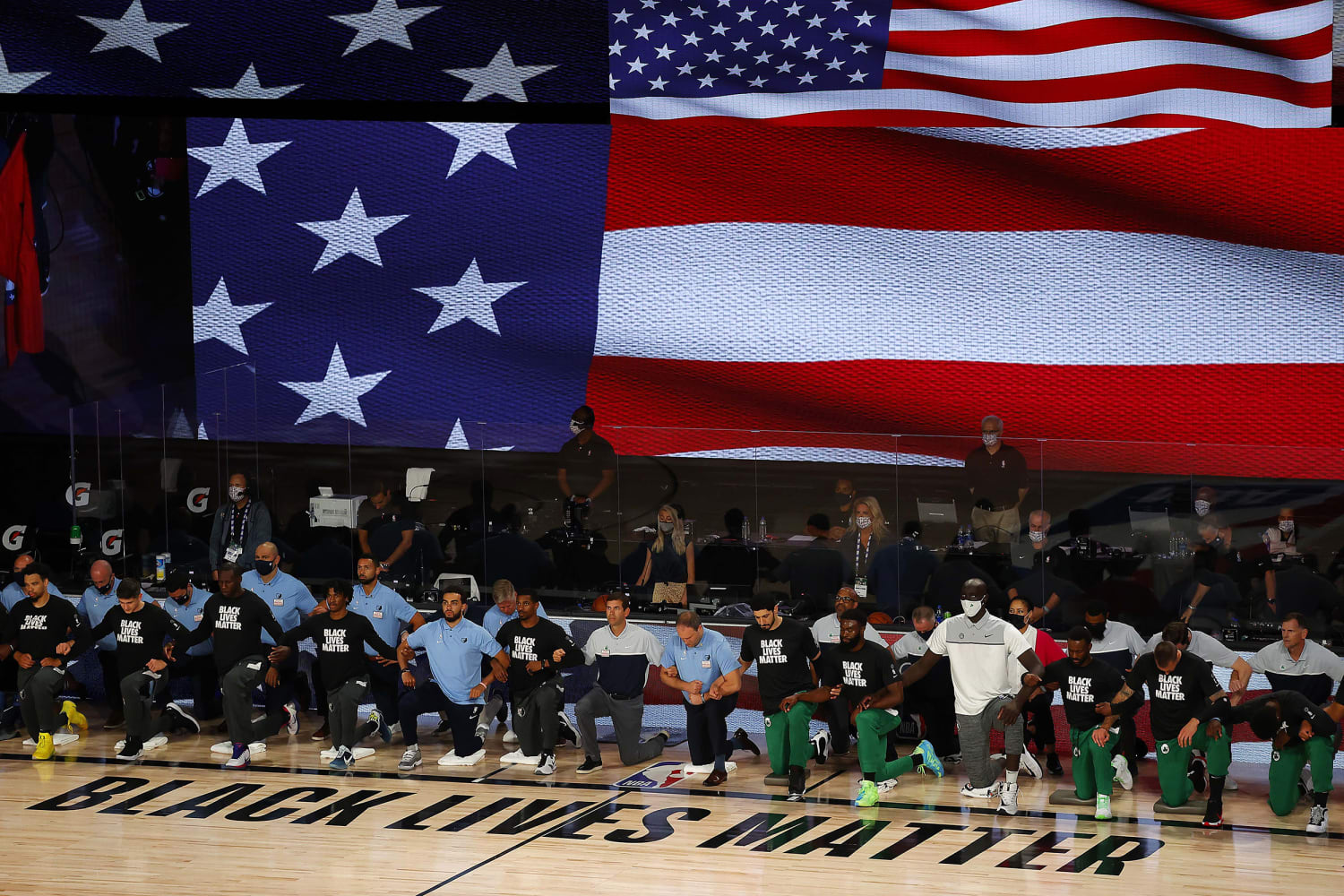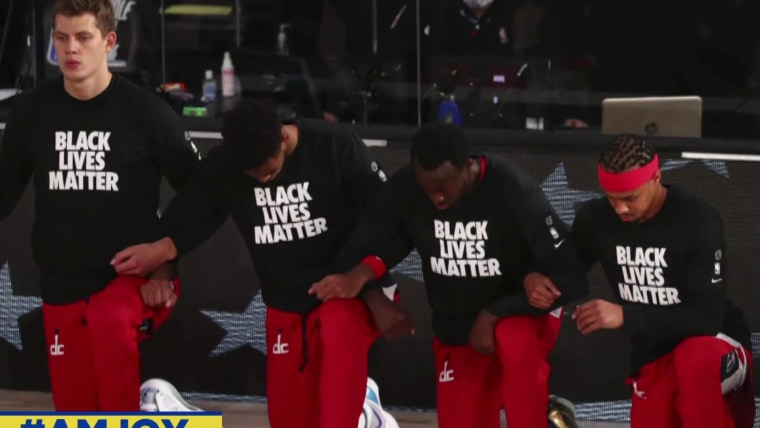Ever since the Capitol riot, every Brooklyn Nets game I watched closely this year began with a disappearing act: The superstar Kyrie Irving wandered off the court. His teammate Kevin Durant, the best basketball player on the planet, followed toward their locker room soon thereafter.
Athletes shouldn’t be forced to stand for a ceremony many players have rejected so wholeheartedly that they’re not even bothering to show up anymore.
An all-too-familiar nightly performance of nationalism would ensue — for 40 years, the National Basketball Association has required players “to stand and line up in a dignified posture” during the national anthem — and then Irving and Durant would return to join their teammates for the starting lineups as if nothing had happened.
It is one thing for so many people at barbecues and ball games this holiday weekend to willfully ignore that “The Star-Spangled Banner” is the product of a poem written by the slave owner Francis Scott Key spewing hate like this: “No refuge could save the hireling and slave / From the terror of flight or the gloom of the grave.” But athletes shouldn’t be forced to stand for a ceremony many players have rejected so wholeheartedly that they’re not even bothering to show up anymore. Their declarations of independence, unseen though the rebuke may be, deserve to be heard this July 4.
You’ll never catch “God Save the Queen” ahead of a match in the English Premier League, and U.S. Soccer repealed its policy requiring players to stand for “The Star-Spangled Banner” amid last year’s global reckoning on race. Even President Joe Biden is OK with Team USA protesting the anthem at the Olympics.
Nearly five years since the quarterback-turned-activist Colin Kaepernick began taking a knee before NFL games to protest police murder and racial injustice, those un-American scourges have become no less vile. Yet a majority of Americans have since woken up, from calling Kaepernick’s gesture “not appropriate” in a 2018 NBC News poll to accepting it after last summer’s surge of basketball protest.
Now two of the NBA’s brightest stars have been skipping the anthem, and more players have broken their league’s rule forbidding hands in pockets or bodies turned against the flag. While several NBA franchises have occasionally added “Lift Every Voice and Sing” to their arena soundtracks, that’s only a start: If the NBA, with nearly 75 percent of players identifying as Black or African American, is really the most liberal sports league on Earth, then the NBA Finals starting this week should be the last time we hear a racist song blare before tipoff again.
Basketball players have been over the national anthem since long before Kaepernick’s silent protest. After all, the original Kap was a hooper: Twenty-five years ago, a reporter finally noticed Denver Nuggets guard Mahmoud Abdul-Rauf staying behind in the locker room for a few extra minutes or tying his Nikes a little tighter pregame, or else turning away from the flag. With his silent protest discovered, Abdul-Rauf doubled down by calling the anthem “a symbol of oppression and tyranny.” The NBA commissioner at the time, David Stern, said the league told him he could remain backstage or come out and stand, or else face suspension. Abdul-Rauf said no. He eventually made a deal to stand and pray, but he was also eventually blackballed from the league.
Nonetheless, and more or less the better for it, the NBA has since fashioned itself as a barometer of cultural progress. Where the other American sports leagues accepted millions from the Pentagon for what Republican senators called “paid patriotism,” basketball banished a racist owner and condemned an anti-trans legislature while welcoming “I Can’t Breathe” T-shirts and a gay player. (The NFL’s first openly gay active player came out just last month.)
When then-President Donald Trump tweeted at the Golden State Warriors in 2017 that they were not welcome at the White House for a championship photo-op, LeBron James replied by calling the president a “bum.” That Sunday, more than 200 NFL players, owners and coaches took a knee or locked arms in a symbol of vague solidarity and disapproval of Trump.
NBA executives, however, worried about the effect that basketball players subsequently kneeling for the anthem might have on their league’s bottom line. In interviews for my new book on the NBA’s influence beyond the game, multiple officials and players described to me a chilling effect — from the office of the current commissioner, Adam Silver, on down to owners, general managers and coaches — that stopped rank-and-file athletes from protesting. Some players expressed regret to Kaepernick that they could not expand his movement for fear of lost contracts and shoe deals. Paid patriotism had given way to silent suppression.
“It was definitely disappointing to see them not take a knee,” Abdul-Rauf told me. But he would rather see a boycott than a symbol. “Even more disappointing was, look, man: Protest the game. Hit ’em in the pocket.”
NBA players did exactly that last summer, following the police shooting of Jacob Blake in Wisconsin. The Milwaukee Bucks’ sudden boycott sparked a strike for racial justice across the sports world, and NBA superstars made structural demands of ownership before returning to play.
In November, the Dallas Mavericks owner Mark Cuban quietly instructed his arena to stop turning on “The Star-Spangled Banner.” Cuban said he was trying to “loudly hear the voices of those who feel that the anthem does not represent them.” But the league, in ultimate deference to playing it safe for the money over progress, quickly overruled him.
Conservatives, meanwhile, have continued to weaponize their distraction campaign against the NBA. Texas legislators last month passed a law requiring pro sports teams in the state to play the anthem. And when James led an all-American movement against Black voter suppression but chose not to condemn Chinese foreign policy, Republicans in Washington once again insisted that James shut up and dribble while telling the league to #GetWokeGoBroke.
But billionaires can be influencers, too. The least that Silver and NBA owners can do is tell conservatives to shut up and listen to players whose silence kneels for itself. Basketball has the power to show ignorant Americans what our politicians cannot, and the anthem’s pregame gleaming flickered out, like a bad firework, long ago. The bravest thing basketball can do now is to retire it.
Source: | This article originally belongs to Nbcnews.com











